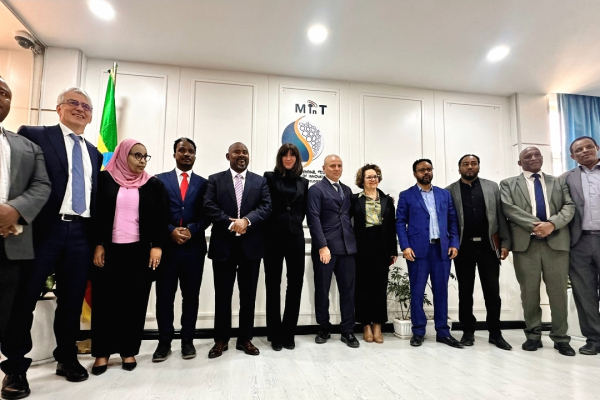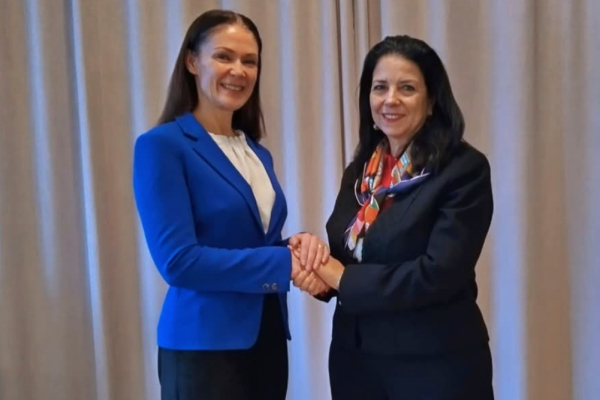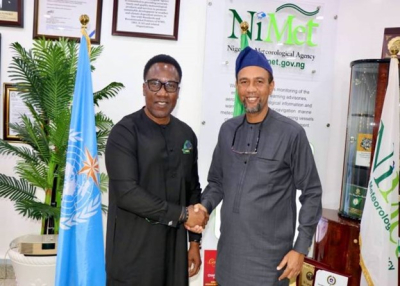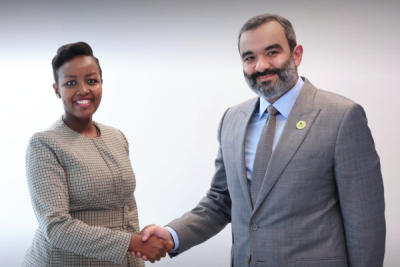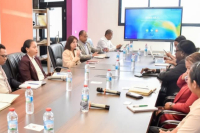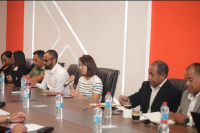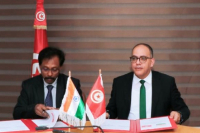
Public Management (597)
The Italian government aims to position the country as a digital and innovation hub in East Africa, relying on international cooperation to achieve this goal.
Ethiopian Finance Minister Ahmed Shide signed a €4.5 million ($4.6 million) grant agreement earlier this week with Italy’s Minister for Universities and Research, Anna Maria Bernini. The collaboration aims to foster the emergence of startups and accelerate the adoption of digital services in Ethiopia.
Specifically, the partnership includes the establishment of an e-services and startup incubation center, a training hub, and a high-tech talent development center. It also involves the creation of a Fab Lab (Fabrication Laboratory) equipped with cutting-edge tools for manufacturing and prototyping.
This initiative aligns with Ethiopia’s Digital Ethiopia 2025 plan, which seeks to harness digital opportunities to transform the country into a knowledge- and innovation-driven economy. Ethiopia has already partnered with the Global Innovation Initiative Group (GIIG) to strengthen its startup ecosystem and has launched a program to train five million coders by 2026.
According to the GSMA, investments in mobile technology and digitalization are expected to drive growth in key sectors such as agriculture, manufacturing, and public services. These efforts could create over one million new jobs and generate 57 billion birrs (around $446.4 million) in tax revenue. Additionally, digital expansion is projected to boost economic growth across various industries, contributing an estimated 140 billion birrs to agriculture and 114 billion birrs to manufacturing by 2028.
By Isaac K. Kassouwi,
Editing by Sèna D. B. de Sodji
Morocco is banking on international cooperation to achieve its digital transformation ambitions. In recent months, the North African kingdom has strengthened ties with countries such as Saudi Arabia, Portugal, and Estonia.
Morocco is seeking closer cooperation with Finland on digital transformation. The topic was discussed on Tuesday, January 28, during a meeting in Finland between Amal El Fallah Seghrouchni, Morocco’s Minister of Digital Transition and Administrative Reform, and Lulu Ranne, Finland’s Minister of Transport and Communications. The meeting was part of a Moroccan delegation's visit.
Talks focused on research, technological innovation, digital infrastructure, and data, according to a statement from Morocco’s Ministry of Digital Transition. El Fallah Seghrouchni emphasized “the importance of leveraging Finland’s expertise in artificial intelligence and advanced technologies while stressing the need to share best practices to strengthen Moroccan expertise in these fields,” the statement said. She also met with key Finnish technology players, including Nokia.
This initiative falls under Morocco’s broader international cooperation strategy for implementing its “Digital Morocco 2030” plan, officially launched in September. In December, Rabat signed a memorandum of understanding with Saudi Arabia to enhance e-government collaboration. Morocco has also strengthened ties with Saudi Arabia, Portugal, and Estonia—widely considered a global leader in digital transformation.
Morocco currently ranks fourth in Africa and 90th worldwide in the United Nations’ 2024 E-Government Development Index, with a score of 0.6841 out of 1. This surpasses the North African average (0.5776), the broader African continental average (0.4247), and the global average (0.6382). However, challenges persist, particularly in developing human capital and improving online services. While the country has made significant strides in cybersecurity, positioning itself as a model in the region, further efforts are needed to strengthen measures and build capacity.
Finland, conversely, ranks ninth globally in e-government and is recognized by the International Telecommunication Union (ITU) as a benchmark in cybersecurity, having achieved a perfect score (20/20) across key pillars, encompassing legislative, technical, organizational, capacity-building, and cooperative measures.
Morocco’s push for international cooperation could accelerate its ambition to make digital technology a key driver of socio-economic development, targeting a contribution of 100 billion dirhams (around $10 billion) by 2030. However, discussions with Finland remain at an early stage, and no agreements have been signed or announced yet.
By Isaac K. Kassouwi,
Editing by Sèna D. B. de Sodji
Agriculture remains the largest economic sector in Africa. However, climate variability and extreme weather events pose significant risks, reducing crop yields, increasing post-harvest losses, and threatening livelihoods. Leveraging digital tools could mitigate these challenges.
The Nigerian Meteorological Agency (NiMet) has signed a Memorandum of Understanding (MoU) with MTN Nigeria and advanced weather intelligence company Tomorrow.io to develop a Digital Climate Advisory Services (DCAS) System. The initiative, signed on January 24, 2025, at NiMet Headquarters in Abuja, aims to deliver localized, actionable weather advisories to farmers via mobile SMS to enhance agricultural productivity and resilience.
NiMet Director General and CEO, Professor Charles Anosike, emphasized that the partnership aligns with the government’s food security agenda, ensuring farmers receive timely weather updates to make informed decisions.
MTN Nigeria CEO, Karl Toriola, reaffirmed the company’s commitment to supporting government initiatives and highlighted the broader impact of the project on agriculture, emergency management, and the Nigerian economy.
Nigeria is highly vulnerable to climate change, ranking 160th out of 181 countries in the 2020 ND-GAIN Index, which assesses nations based on their exposure to climate risks, global challenges, and their capacity to enhance resilience. This underscores the urgent need for adaptive measures to safeguard its economy and population.
The DCAS system is expected to empower farmers with real-time weather insights, mitigating climate-related risks and strengthening Nigeria’s agricultural sector. As per the MoU, the parties will work together to develop, implement, and test the DCAS platform, delivering weather-based advisories to farmers via SMS notifications.
This initiative represents a convergence of digital technology, climate resilience, and economic development. By leveraging mobile connectivity to deliver climate-smart solutions, Nigeria can modernize its agricultural sector, enhance food security, and build a more resilient economy.
Hikmatu Bilali
Data centers are critical to Africa's digital development as they provide the foundational infrastructure for storing, processing, and transmitting data. The expansion of data centers in Africa supports digital transformation, accelerates innovation, and boosts economic growth by attracting investments and enabling businesses to scale in a rapidly evolving digital economy.
PAIX Data Centres, a provider of digital infrastructure in Africa, has announced the construction of a state-of-the-art data centre in Dakar, Senegal, marking a significant milestone in its West African expansion. This new development, revealed on January 27, underscores PAIX’s commitment to meeting the growing demand for high-quality digital infrastructure across the continent.
For Boubacar Fall Sy, Managing Director of PAIX Data Centres Senegal, “The construction of this new data centre in Dakar demonstrates our commitment to the development of digital infrastructure in West Africa. We look forward to providing local and international businesses with world-class colocation and connectivity services, facilitating their digital transformation.”
The PAIX Dakar facility is designed to meet the highest global standards, offering 1.2 MW of IT load to ensure a stable power supply for critical operations, 918 m² of colocation space to provide scalable hosting solutions, and 330 secure bays for IT equipment in a controlled environment. The first phase of the project is set to be operational in 2026, enabling businesses to access reliable connectivity and world-class colocation services.
Aligned with its environmental goals, PAIX aims to use 100% renewable energy for its data centres by 2030. The Dakar facility will incorporate innovative design strategies to maximize efficiency, minimize water consumption, and reduce its carbon footprint, supporting Senegal’s sustainability efforts.
Dakar, already a critical connectivity hub with submarine cables such as ACE, MainOne, SAT3, and SHARE, will soon benefit from the 2Africa cable, further positioning the new data centre as a strategic access point for businesses targeting West African markets. The facility will provide essential digital infrastructure to support innovation, bolster competitiveness, and drive economic growth in the region.
The project will have a significant socio-economic impact. It is expected to create 200 construction jobs and 20 full-time operational roles while also providing opportunities for local suppliers, including architects, contractors, and maintenance providers. This development will strengthen Senegal’s digital infrastructure, attract international investment, and foster technological growth.
The number of data centres in West Africa surged from 2 to 47 between 2012 to 2022, according to the World Bank's 'Digital Progress and Trends Report 2023,' reflecting the region's accelerating digital transformation. This trend aligns with the Digital Senegal 2025 strategy, which seeks to position the country as a leader in the digital economy, underscoring the critical role of infrastructure like the new PAIX data center in achieving these objectives.
Hikmatu Bilali
Like many African countries, Cameroon is working to incorporate information and communication technologies (ICT) into its public services to improve its administration. This transition relies heavily on training government employees to modernize their administrative practices and effectively address the challenges of the digital age.
Cameroon will begin the construction of four "smart campuses" in Yaoundé, within the next five months, the government said last Monday. The project, a partnership with the Korean International Cooperation Agency (KOICA), is part of the government's digital transformation strategy to modernize public administration.
"The four smart campuses will accelerate the awareness and training of young Cameroonians," said Joseph Le (photo, center), Minister of Public Service and Administrative Reform, at the first session of the project's Steering Committee. "KOICA has shared the plans for these campuses with us, and construction is expected to begin simultaneously at all four sites by June at the latest. This timeline aims for the campuses to be operational within 24 months."
The $8 million project aims to promote e-governance and train current and future public servants in the use of information and communication technologies (ICT). The campuses will be built at the National School of Administration and Judiciary (ENAM), the National School of Posts, Telecommunications, and Information and Communication Technologies (SUP'PTIC), the Higher Institute of Public Management (ISMP), and the Ministry of Public Service.
Cameroon currently ranks 155th out of 193 countries on the United Nations e-Government Development Index, with a score of 0.4294, a drop of 14 places from 2022. By modernizing its administration and enhancing the skills of younger generations, the government aims to build a more efficient and resilient public administration.
Samira Njoya
As a global leader in e-government, ranking sixth worldwide, Saudi Arabia is increasingly attracting African nations seeking partners for their digital transformation journeys. This growing interest was recently solidified with the signing of a memorandum of understanding with Morocco in December 2024.
Rwanda is exploring potential collaboration with Saudi Arabia in digital transformation, the Rwandan Ministry of ICT and Innovation announced earlier this week. Minister Paula Ingabire met with Saudi Minister of Communications and Information Technology Abdullah Alswaha on the sidelines of the World Economic Forum in Davos this week to discuss a potential partnership.
Discussions between the two ministers focused on innovation, technology, artificial intelligence, and enhancing technological capacity. Any eventual partnership would fall under the framework of the Digital Cooperation Organization (DCO), headquartered in Riyadh, Saudi Arabia.
This initiative aligns with Rwanda’s ambition to leverage ICT and innovation to drive economic growth, reduce poverty, and transition to a knowledge-based, upper-middle-income economy by 2035.
Saudi Arabia, ranked sixth globally on the UN's 2024 E-Government Development Index, boasts a near-perfect score of 0.9602 out of 1. The kingdom has also excelled in subcategories like online services (0.9900) and telecom infrastructure (0.9841). Moreover, the International Telecommunication Union (ITU) recognizes Saudi Arabia as a cybersecurity model, having fully complied with all five pillars of the cybersecurity index.
In contrast, Rwanda ranks 118th on the global e-government index, with a score of 0.5799—above the East African average (0.3903) and the continental average (0.4247) but below the global average of 0.6382. The ITU also highlights Rwanda as a strong performer in cybersecurity but still faces gaps in technical measures.
A potential partnership with Saudi Arabia could significantly accelerate Rwanda’s digital transformation. However, while broad areas of cooperation have been discussed, the specifics are yet to be outlined. Talks remain early, and no agreements have been finalized or officially announced.
By Isaac K. Kassouwi,
Editing by Sèna D. B. de Sodji
Madagascar aims to accelerate the digital transformation of all sectors of the economy. Last week, the government identified two pilot sites to launch the country's hospital digitization program.
The Malagasy government plans to transform the National Center for Distance Learning of Madagascar (CNTEMAD) into a digital university. A working meeting was held on Tuesday, January 21, bringing together various stakeholders: the Ministry of Higher Education and Scientific Research, the Ministry of Digital Development, Posts, and Telecommunications, the CNTEMAD leadership, and the Agence Universitaire de la Francophonie (AUF), which serves as the technical partner for the initiative.
During the meeting, the parties discussed the technical improvements necessary for the project’s implementation. “One of the agenda items was the development of a timeline for the project’s implementation, as well as the coordination of the technical aspects required for its realization,” informed the Ministry of Digital Development, Posts, and Telecommunications in a press release, without providing further details.
Established in 1992, CNTEMAD primarily relies on printed materials for instruction, supplemented by assignments, in-person group sessions, and practical ICT-focused exercises. The institution encourages group work and offers audiovisual resources upon request. Examinations are conducted twice a year. In 2024, CNTEMAD served approximately 17,000 students. Its transformation into a digital university aligns with efforts to digitize the national education system as part of a broader national digital transformation initiative.
In July 2024, the government launched the process of digitizing schools across the country. The project aims to equip administrative and educational zones and institutions with tools and resources to leverage digital technologies effectively.
However, challenges remain. Internet availability and access to compatible devices (computers, tablets, smartphones) may limit student access to the digital university's platforms. According to the Communication Technology Regulation Authority (ARTEC), internet penetration in Madagascar was 32.57% in 2024, with an estimated population of 30.3 million.
By Isaac K. Kassouwi,
Editing by Sèna D. B. de Sodji
The Malagasy government aims to accelerate the country's digital transformation, positioning it as a cornerstone of the Malagasy economy. This effort encompasses all sectors, including the field of healthcare.
The Malagasy government plans to digitize hospitals nationwide. Stéphanie Delmotte, Minister of Digital Development, Posts, and Telecommunications, recently met with officials from the Ministry of Public Health to select two pilot sites for the program's launch.
"This program aims to modernize public hospitals through the strategic of digital technologies," the Ministry of Digital Development, Posts, and Telecommunications announced on Facebook on Monday, January 20th. "Key priorities include streamlining patient flow, ensuring the traceability of medical records, and enhancing service transparency."
This initiative aligns with the Malagasy government's vision to "leverage digital technology to drive national development," as outlined in the 2023-2028 Digital Strategic Plan (PSN). The PSN aims to position the country as a key player in Africa's burgeoning digital economy. Within the healthcare sector, the government is committed to investing in human capital and good governance, improving accessibility to quality care, and fostering public trust in the national healthcare system.
In its 2024 report, "Health Data Digitalization in Africa: Unlocking the Potential," the World Health Organization asserts that digitalization empowers healthcare professionals to make more informed treatment decisions and supports policymakers in developing impactful health policies.
However, the WHO acknowledges that significant challenges remain in Africa's pursuit of digital health transformation. These challenges include fragmented health systems and information silos, a lack of standardized data formats, inadequate infrastructure, and limited digital literacy among healthcare professionals. Moreover, limited access to high-speed internet within hospitals and insufficient interconnectivity between healthcare facilities pose significant obstacles.
By Isaac K. Kassouwi,
Editing by Sèna D. B. de Sodji
In recent years, the Republic of the Congo has undertaken a significant digital transformation, characterized by substantial infrastructure development. To successfully navigate this transition, the country requires committed stakeholders to spearhead and support initiatives focused on modernizing the nation and fostering greater digital inclusion.
The government of Congo-Brazzaville carried out a cabinet reshuffle on Saturday, January 11. Some ministers retained their positions, including Léon Juste Ibombo, Minister of Posts, Telecommunications, and the Digital Economy. His reappointment underscores the government's commitment to continuing the momentum initiated in 2015 to leverage digital technology as a driver of economic and social transformation.
Major Achievements
Since his appointment, Léon Juste Ibombo has spearheaded ambitious initiatives aimed at modernizing digital infrastructure and enhancing technological inclusion. Under his leadership, several large-scale projects have been launched. The construction of the national backbone has improved internet connectivity across the country. The launch of the "Caria Tech Village," a technology park, has fostered innovation and attracted investments in the digital sector. The digitization of public services, notably through the introduction of a digital driver's license, has modernized administrative processes.
The Digital Transformation Acceleration Project, funded by the World Bank, has also improved internet access, including in rural areas. These accomplishments have also led to deploying fiber optics and introducing 4G and 5G technologies, making Congo the first country in the subregion to adopt such advanced connectivity.
Challenges and Strategic Priorities
Despite these advances, the country needs to consolidate its progress by undertaking several projects. One of the top priorities is developing a national artificial intelligence (AI) strategy that incorporates solutions tailored to local needs. The creation of an e-government portal, centralizing online administrative services, is another critical objective. Furthermore, improving AI research is essential to strengthen the country's scientific capabilities in strategic fields.
The minister is also working on establishing a dynamic startup ecosystem, with programs dedicated to young entrepreneurs in the tech sector. Initiatives to bridge the digital divide, such as providing internet access to schools and remote communities, are central to his agenda. These efforts reflect a strategic vision to position Congo as a key player in the digital economy in Central Africa. In 2024, Léon Juste Ibombo was featured in the annual ranking of the 50 most influential figures in African tech, compiled by We Are Tech Africa. This recognition highlights his pivotal role in the ongoing transformation of the sector.
By Samira Njoya,
Editing by Sèna D. B. de Sodji
International collaborations in the digital sector are essential for fostering innovation and sharing expertise. By joining forces, countries drive technological development, create economic opportunities, and enhance their competitiveness on the global stage.
Tunisia and India aim to deepen their collaboration in the technology sector, a shared ambition that took center stage at the fifth meeting of the Tunisia-India Joint Committee on Scientific and Technological Cooperation. The meeting was held on Wednesday, January 8, at the Ministry of Higher Education and Scientific Research in Tunis.
During the discussions, both countries agreed to launch a call for proposals to fund joint initiatives focusing on priority areas such as environmental innovation, e-health, and geospatial technology. These projects will involve economic and social stakeholders and be complemented by joint workshops to foster exchanges and collaboration between Tunisian and Indian researchers.
The initiative builds on the scientific cooperation agreement signed in 1995 and the 2020 partnership that established the Tunisia-India ICT Innovation Center.
The collaboration offers mutual benefits. India, renowned for its expertise in digital and geospatial technologies, provides Tunisia with a valuable opportunity to leverage its know-how while strengthening local research and innovation capacities. The strategic partnership also allows India to expand its ties with North Africa and bolster its influence in key technological fields, including innovation hubs and drone applications.
Tunisia, meanwhile, is one of Africa's most dynamic countries in digital development. According to the ICT Development Index 2024 by the International Telecommunication Union (ITU), Tunisia ranks 8th in Africa with a score of 77.2 out of 100, highlighting significant progress in its ICT sector.
By Samira Njoya,
Editing by Sèna D. B. de Sodji
More...
Digital transformation is at the heart of Mali's socio-economic development plans. To bring these ambitions to life, the government is focusing on strengthening the security of the national cyberspace.
The Malian government plans to adopt its national cybersecurity strategy this year, according to Government News Bulletin No. 249 published on Friday. The bulletin outlines the Ministry of Communication, Digital Economy, and Administrative Modernization's 2024 performance review and 2025 prospects.
"Cybersecurity is a major global concern as the sophistication of cyberattacks and the financial damage they cause to countries have risen exponentially. Indeed, the rapid pace of innovation in the ICT sector has led to inadequate legislative and regulatory cybersecurity frameworks," states the draft national cybersecurity strategy, which began validation in January 2024.
The adoption of this strategy is deemed essential as the Malian government aims to build a strong and resilient digital Mali, leveraging digital technology as a driver of economic growth, modernization, and prosperity. The strategy seeks to enhance cybersecurity governance, strengthen international cooperation, and foster a culture of cybersecurity through information, training, and research. It also includes measures to protect critical infrastructure, notably through the establishment of security standards and frameworks.
Currently, Mali is ranked in the fourth tier (Tier 4) out of five in cybersecurity by the International Telecommunication Union (ITU) in its Global Cybersecurity Index 2024. This tier comprises countries with an overall score of at least 20/100, demonstrating basic cybersecurity commitment, with government actions aimed at assessing, establishing, or implementing generally accepted cybersecurity measures in at least one domain.
The strategy is still in the development phase. Furthermore, a mere adoption is not enough. It is crucial to implement the actions it outlines. The ITU notes that Mali has a relatively strong performance in legislative measures, scoring 12.36 out of 20 in this pillar. However, significant efforts are required in other areas: technical measures (4.56 out of 20), organizational measures (2.9 out of 20), capacity development (0.79 out of 20), and cooperation (8.87 out of 20).
By Isaac K. Kassouwi
Editing by Sèna D. B. de Sodji
The two kingdoms signed a memorandum of understanding in December, agreeing to collaborate on research, innovation, and the adoption of advanced technologies in e-government. This partnership will involve sharing best practices and enhancing specialized capacities.
Morocco wants to strengthen its cooperation with Saudi Arabia, particularly in the fields of artificial intelligence (AI), digital transformation, and administrative reform. The issue was discussed last week during a working meeting between Amal El Fallah Seghrouchni (photo, left), Morocco’s Minister of Digital Transition and Administrative Reform, and Sami bin Abdullah bin Othman Al-Saleh (photo, right), Saudi Arabia’s Ambassador to Morocco.
The initiative is part of the Moroccan government’s international cooperation efforts to implement its new digital transformation strategy, “Digital Morocco 2030,” officially launched last September. A memorandum of understanding was already signed in December with Saudi Arabia to enhance cooperation in e-government. Morocco has also forged closer ties with Portugal and Estonia, the latter being regarded as one of the world leaders in digital transformation.
Saudi Arabia ranks sixth worldwide on the UN Department of Economic and Social Affairs (DESA) E-Government Development Index, with a score of 0.9602 out of 1. In the sub-indices for online services and telecom infrastructure, the kingdom scores 0.9900 and 0.9841, respectively. Moreover, the International Telecommunication Union (ITU) considers Saudi Arabia a model in cybersecurity, having achieved full compliance with all five pillars of the Cybersecurity Index.
Morocco ranks fourth in Africa and 90th globally in e-government, with a score of 0.6841 out of 1. The kingdom surpasses the averages for North Africa (0.5776), Africa (0.4247), and even the global average (0.6382). However, further efforts are needed, particularly in developing human capital and improving online services. In cybersecurity, Morocco is also seen as a regional model, but it must intensify its efforts to strengthen measures and build capacities.
The Moroccan government’s cooperative efforts could accelerate its ambition to position the kingdom as a digital hub, thereby driving social and economic development by 2030. The government aims for the digital sector to contribute an estimated 100 billion Moroccan dirhams (10 billion USD) by that time. The discussions remain at a preliminary stage. Even for the memorandum of understanding signed in December 2024, no specific timeline has yet been announced for its implementation.
By Isaac K. Kassouwi,
Editing by Sèna D. B. de Sodji
The Gambian government aims to accelerate the country’s digital transformation. In May 2024, the executive already established a partnership with the Emirati technology company Presight.
The Gambian Ministry of Communications and Digital Economy has partnered with the Kalp Foundation, a nonprofit organization dedicated to developing blockchain-based digital public infrastructure (DPI). This collaboration will lead to the creation of a decentralized platform called “Gambia One,” designed to secure data exchanges, streamline government operations, and digitize critical services.
“Together, we will harness the power of blockchain-enabled DPI to deliver innovative, citizen-centric solutions that align with global standards of trust, transparency, and accountability,” said Lamin Jabbi, Gambian Minister of Communications and Digital Economy. The partnership also includes capacity-building initiatives for government leaders and training programs focused on blockchain ecosystems and related technologies for young Gambians.
This initiative aligns with the Gambian government’s ambition to “leverage technology, digital solutions, and services to ensure digital inclusion by connecting the unconnected and under-connected, create jobs, and develop the economy.” It builds on earlier efforts, including a partnership established with the Emirati tech company Presight in May 2024. Additionally, in 2023, Gambia joined the Smart Africa Alliance, which promotes the use of ICT to accelerate economic and social development across Africa.
Currently, Gambia ranks 164th out of 193 countries in the 2024 E-Government Development Index measured by the United Nations Department of Economic and Social Affairs (UNDESA). The country scored 0.2552 out of 1, significantly below the averages for West Africa (0.3957), Africa (0.4247), and the global average (0.6382).
The timeline for launching the Gambia One platform remains unknown, as do the precise details of the agreement between the parties involved. However, the success of the initiative will depend on the population’s access to the internet and compatible devices. According to DataReportal, Gambia had 1.5 million internet users at the start of 2024, representing an internet penetration rate of 54.2%.
By Isaac K. Kassouwi,
Editing by Sèna D. B. de Sodji
The Congolese government is banking on international cooperation to accelerate its digital transformation. In November 2024, a memorandum of understanding was already signed with Poland to develop digital infrastructure.
The Democratic Republic of Congo (DRC) and Qatar are exploring ways to strengthen bilateral cooperation in the information and communication technology (ICT) sector, among others. The issue was discussed during a meeting between Congolese President Félix Tshisekedi (photo, left) and Qatar's Emir, Sheikh Tamim bin Hamad Al Thani (photo, right), on Sunday, January 5, during an official visit to the Middle Eastern nation.
This rapprochement comes as the Congolese government intensifies its efforts under its vision of making "Congolese digital technology a lever for integration, good governance, economic growth, and social progress." In 2024, the country ranked 41st out of 47 African nations in ICT development, according to the International Telecommunication Union (ITU), with a score of 31 out of 100. Furthermore, official sources report that internet penetration in the DRC is at 30%, compared to about 50% for mobile telephony.
The United Nations Department of Economic and Social Affairs (UN DESA) ranked the DRC 175th out of 193 countries globally in e-government development in 2024, with a score of 0.2715 out of 1. This places the country below the regional averages for Central Africa (0.3354), Africa (0.4247), and the global average (0.6382).
Regarding cybersecurity, the ITU places the DRC in Tier 3, a category for countries that "demonstrate a basic commitment to cybersecurity through government-led actions, including assessment, establishment, or implementation of some generally accepted cybersecurity measures." The country faces significant challenges in areas such as technical measures, capacity building, and cooperation.
In contrast, Qatar boasts an ICT development score of 97.8 out of 100 and an e-government development score of 0.8244. The ITU also considers Qatar a global model in cybersecurity.
Strengthening collaboration with Qatar could provide the Congolese government with the support needed to develop its ICT sector and accelerate its digital transformation ambitions. However, the specific details of this partnership, including areas of intervention and implementation timelines, have yet to be defined. Moreover, no formal agreement has been signed or officially announced between the two parties at this time.
By Isaac K. Kassouwi
Editing by Sèna D. B. de Sodji


